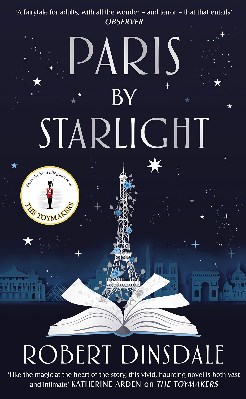See the small girl: she is waiting, as we all once waited, for her father to come and tell her bedtime stories.
Teeth brushed, hair combed; Esmé is the very picture of a model child. Tonight she is in her unicorn pyjamas – though unicorns, those magical beasts which once consumed her every thought, have (for reasons obvious to every parent in Paris) fallen out of fashion of late. With her bear in her hands, she sits impatiently at the end of the bed.
Patience, her parents tell her, is a virtue. But if virtue feels like this, well, surely it is overrated. Her father has been too long in coming tonight, so it is hardly Esmé’s fault when her eyes start roaming the nursery floor. Boredom is satisfied by so few things, now that she is almost seven years old. A turn on the rocking horse does so little to help. Settling her dolls in their wooden bunks and telling them a story of their own lasts barely five minutes. She upends boxes, puts together puzzles, makes an unholy mess and tidies it into her toybox again, but none of it will do. Something else is nagging at her. Something else is demanding to be done.
She stands on the sheepskin rug and turns to the nursery window.
The curtains are already drawn, but by pulling a cord Esmé can draw them back. Hidden behind are the shutters that her father built to ‘block out the night’. She unfastens the latch and lets them roll back. On the other side, the window is covered in thick black felt, glued down in every corner. What it might be like, to lift just a corner, to catch a glimpse of the night-time world . . .
Such things are forbidden. And yet . . . the stories Esmé loves – the ones her father takes such delight in spinning for her each night – aren’t they full to bursting with courageous girls doing forbidden things?
‘Esmé?’
It is her father’s voice. When she turns, her face flushing a guilt-ridden red, she sees him standing there, across an ocean of all the books and toys he ever bought her. In his hands are a glass of milk, a bedtime biscuit, the threadbare cardigan she has been taking to bed with her since she was a babe.
She closes the shutter and goes to him. He has told her about the window before. She is not supposed to need telling twice. But her father’s admonishment is all in his eyes; he is too weary to scold her, so together they go to the bed and settle down in the blankets.
Once upon a time . . .
Words to soothe even the most troubled of souls. Esmé knows her father has been tormented of late. It is whatever is happening out there in the Parisian night, taking its toll on the man she loves more than anyone else. But she snuggles close and lets his words wash over her, and now she is safe, where she belongs – and she believes he feels safe as well, safe from everything that exists beyond the nursery walls. That feeling of sanctuary in arms: if only you or I were innocent enough to feel it again.
After he is done, they make their ritual of goodnights, kisses and hugs.
‘I love you, Esmé. Get some good sleep; your mama is coming in the morning.’
Goodnight is hardly goodnight; chances are, he’ll wake up to find that she’s crawled into his bed some time in the smallest hours.
After he has gone, Esmé turns in bed. The window is right there, right where she left it, and this presents the most tantalising conundrum of all. For an age, she tries to think of other things. In the morning there will be school. Élodie, who lives in the apartment downstairs, is to receive a bichon frise for her birthday. But these things can hardly keep away the idea which battles back to the top of her mind.
Ideas: such terrible, untrustworthy things. She hardly knows it when she gets out of bed. She is thinking of nothing as she steals back to the curtains, unlatches the shutter, and sets to work at the blackout again.
First one inch, then a second and a third. Soon there is enough space for Esmé to slide her hand between the blackout and the window pane itself.
She looks out upon Paris: this wonderful city of lights.
